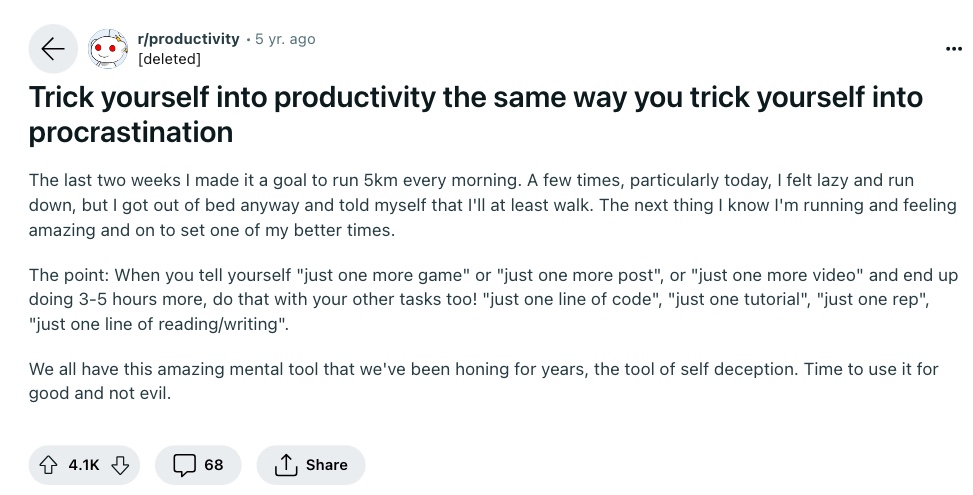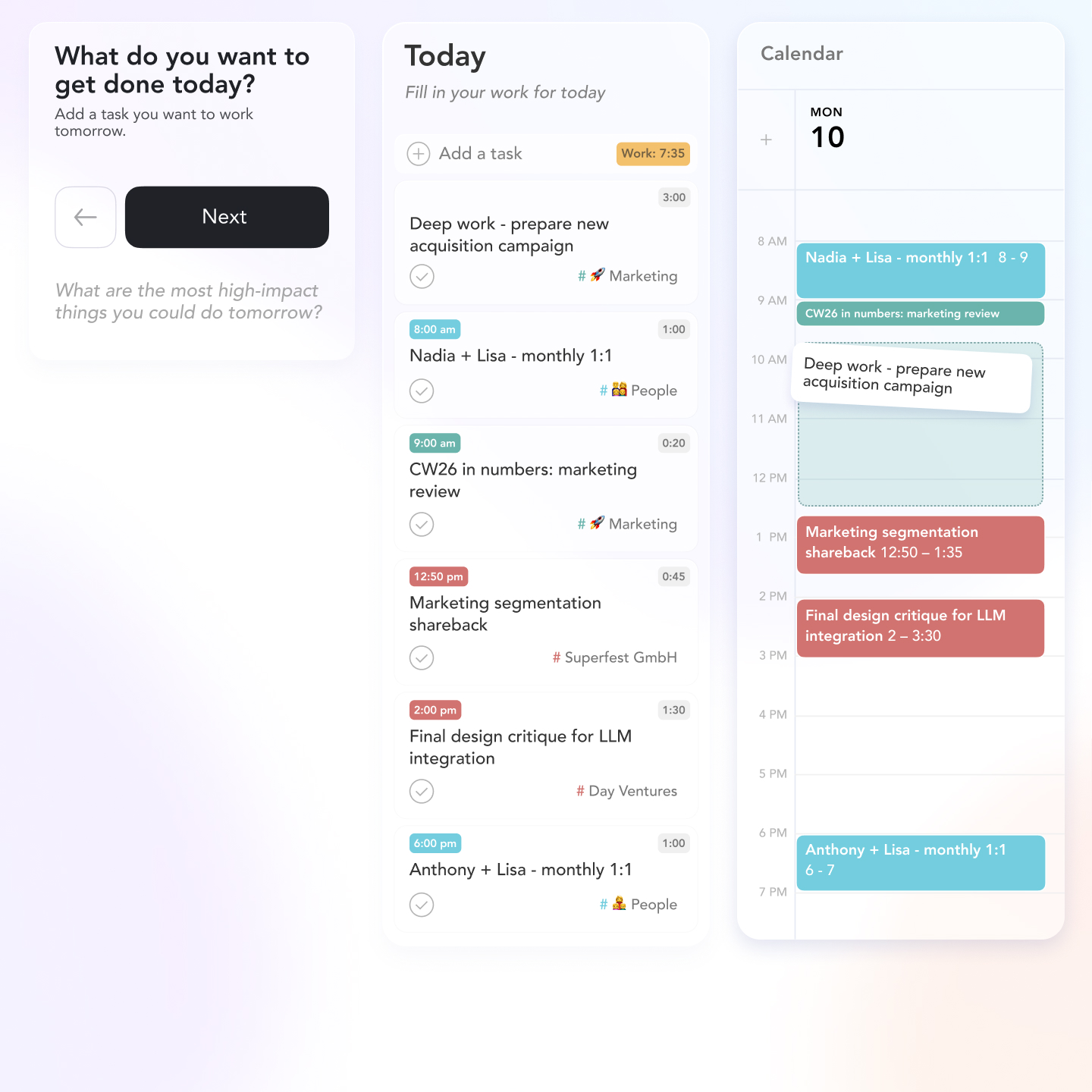We know the cycle all too well — resolving to finally get that big project done, only to squander the day watching YouTube rabbit holes about artisanal cheese making or reading Reddit threads about bathroom makeovers. Anything to avoid starting that daunting task we committed to powering through.
Whether your goal is getting ahead at work, taking charge of your health, or finally checking off those long-held bucket list items, procrastination has a way of chipping away at your ability to make progress. Maybe you're procrastinating on a task right now by reading this article in hopes of overcoming it once and for all.
The good news is that we can tackle our procrastination without resorting to extreme measures. You don't have to throw your distracting phone in the nearest lake or drastically overcommit with public deadlines to create artificial pressure
Reclaiming your time and being productive is absolutely achievable if you understand what's really driving your habit of putting things off. Let's start by understanding what procrastination is.
What is procrastination
Procrastination is continually postponing and avoiding tasks that need to get done, often replacing them with distracting activities that provide temporary relief or entertainment instead. It's putting something off until later for no good reason, despite being aware of the negative consequences associated with not acting on your task.

It's important to understand exactly what procrastination isn't as conflating it with those other behaviors makes it harder to overcome. Understanding procrastination as a distinct behavior pattern will help you implement the right behavior changes.
Procrastination is not laziness, poor time management, avoidance, or distractions.
People often confuse procrastination with laziness, but they are not the same thing. Laziness is an unwillingness to exert effort or energy, regardless of the task or deadline. Procrastination, on the other hand, is the delaying of a specific task, even if the person is willing to work on other tasks. Procrastination is often accompanied by feelings of guilt, stress, and anxiety, as the person is aware that they should be working on the task at hand. Laziness may not evoke such feelings.
Another concept often confused with procrastination is poor time management. While procrastination can lead to poor time management, they are not the same. Some people may have good intentions and plan their time effectively but still struggle with procrastination when it comes to actually starting or completing tasks.
Procrastination is not avoidance. Procrastination involves delaying a task but still intending to complete it at some point, often at the last minute. Avoidance, however, is the complete evasion of the task, with no intention of engaging with it at all.
Don't confuse procrastination with distraction, too. While distractions can enable procrastination, procrastination is a conscious choice to delay a task, rather than simply being distracted from it.
Why do we procrastinate
Dr. Timothy A. Pychyl, the author of Solving the Procrastination Puzzle, shares an interesting insight in his book: Procrastination is often linked to emotional management surrounding a task. When facing a task that stirs up feelings of inadequacy, anxiety, or boredom, procrastination serves as an emotional coping mechanism.
For example, someone who is assigned to draft a complex report might procrastinate due to fear of inadequate performance, opting for simpler tasks like responding to emails to avoid feeling overwhelmed and incompetent. This choice is driven by an impulse to avoid discomfort and seek immediate pleasure, rather than enduring something less pleasant for a future benefit.
Our brains are wired to prioritize immediate satisfaction and relief, a trait that can be traced back to more primitive survival instincts where immediate rewards were crucial for survival. Because of that, we tend to value immediate rewards more highly than future rewards. The further away the reward or consequence, the less it influences our decisions in the present.
The core issue here is that our emotional response to the immediate options (ease and comfort) outweighs rational, longer-term planning, leading us to procrastinate and deal with the consequences later. This bias towards the present can often make it difficult to make decisions that are best for our long-term well-being.
Another common cause is a lack of interest or motivation. When a task isn't personally meaningful or engaging, it can be hard to summon the energy to start or maintain focus. Without a clear connection to one's goals or interests, even crucial tasks can seem unappealing, leading to procrastination.
By recognizing that procrastination is a strategy to manage negative feelings, we can start to develop more effective coping mechanisms.
How to overcome procrastination (even if you've tried and failed till now)
Simply telling ourselves to stop procrastinating is ineffective, and relying on "productivity hacks" that focus solely on increasing work output fails to address the underlying reasons why we procrastinate in the first place. Let's look at some of the strategies that help you overcome procrastination:
Break tasks into smaller, manageable steps
One of the main reasons people procrastinate is that they feel overwhelmed by the complexity or scale of a task. By breaking it down into smaller, concrete steps, you can reduce the perceived difficulty and make it easier to get started. Focus on taking that first small action, and the momentum will often carry you forward.

An insightful Redditter once shared a useful mental trick to reframe procrastination and boost productivity.

Instead of applying "just one more" to procrastination activities, we can apply it to the tasks we need to do. Break your tasks down into small, manageable steps and tell yourself you'll do "just one" small action.
And here's the key: Breaking tasks into subtasks provides a sense of immediate progress and achievement. This is important because our brains are wired to seek out rewards. When we accomplish something, even something small, our brain releases dopamine, a neurotransmitter associated with pleasure and motivation. This dopamine hit reinforces the behavior, making us more likely to continue.
You can use tools like Sunsama to help you create a task list and jot down the subtasks you need to do to check off the main task. Crossing things off of the to-do list one by one will give you the motivation to move on to the next thing.
Here are some ideas to break your big task into subtasks:
- The "Time Travel Method": Imagine yourself in the future, having already completed the big task. Now, work backward and think about what steps you took to get there. This can help you identify the necessary subtasks and create a roadmap to your end goal.
- The "Pomodoro Method": Break your task into subtasks that can be completed in 25-minute intervals (the typical "Pomodoro" duration). If a subtask is too large to complete in 25 minutes, break it down further. Dedicate each Pomodoro to a single subtask.
Before finalizing your subtasks, review them to ensure they're in a logical order. Some subtasks may depend on others being completed first. Rearrange your subtasks so that you're not blocked by dependencies and can maintain a smooth workflow. This will help you avoid the mistake of getting stuck or having to redo work.
Align tasks with your long-term goals
How can you engage with that task, even if it's not inherently enjoyable? One idea is to align it with your goals and give yourself a sense of purpose and meaning beyond the task itself.
When you think about your long-term goals and values, you engage the prefrontal cortex, the part of your brain responsible for complex planning, decision-making, and impulse control. By activating these higher-level functions, you can override the more primitive impulse to avoid discomfort or seek immediate gratification.
Then you're no longer just doing the task for its own sake, but because it contributes to something you care about deeply. This sense of meaning can be a powerful motivator, making it easier to push through the discomfort or boredom of the task.
Here are 3 steps to align your tasks with your goals and values:
- Clarify your values and long-term goals: Before you can align your tasks, you need a clear understanding of your values and long-term goals. What's most important to you in life? What do you want to achieve in the next 5, 10, or 20 years? Take some time to reflect on these questions and write down your answers.
- Break down long-term goals into smaller milestones: Once you have your long-term goals, break them down into smaller, more manageable milestones. For example, if your goal is to write a book, your milestones might include completing the outline, writing the first chapter, finishing the first draft, etc.
- Connect tasks to milestones: Look at your to-do list and ask yourself, "How does this task contribute to my milestones and long-term goals?" If a task doesn't seem to contribute, ask yourself if it's truly necessary. If it is, look for ways to reframe it in terms of your goals.
Practice "good procrastination"
We're often told that procrastination is something to avoid at all costs. But, as Paul Graham points out in his excellent essay "Good and Bad Procrastination," not all procrastination is created equal. Graham makes a key distinction between procrastinating on trivial tasks such as running errands that are not urgent (bad procrastination) versus procrastinating on less important work to focus on something more meaningful (good procrastination) such as talking to your customers.

The truth is that we all have a limited amount of time and energy. Spending it on errands and minor to-dos that have little lasting impact is ultimately a form of procrastination from real work.
The hard part is determining what that "real work" is for you. Graham suggests asking yourself two questions:
- “What's the best thing I could be working on right now?"
- "Why am I not working on it?"
This forces you to confront whether you're putting off important work for less consequential tasks. If you are, try to redirect your procrastination towards the work that matters most.
Our advice?
Don't worry about clearing every minor task from your plate before getting started. Instead, allocate dedicated time blocks for that passion project or grand goal, even if it means putting off some smaller fires temporarily. You'll be amazed at what you can accomplish when you go all-in on what matters most.
The key is being honest about what activities are truly vital, and having the wisdom to let go of the rest.
Sunsama can help you leave procrastination behind
While understanding the root causes of procrastination and having effective strategies to overcome it is crucial, having the right tools can make the process much easier. This is where Sunsama can help.
Sunsama is a daily planner that can help you implement the strategies we've discussed seamlessly into your daily routine. With Sunsama, you can:
- Break down your tasks into manageable subtasks: Sunsama allows you to create a task list and jot down the subtasks you need to complete each main task. Crossing things off the to-do list one by one will give you the motivation to move on to the next thing.
- Align your tasks with your long-term goals: At the start of the week, spend a few minutes deciding what your priorities are for the week ahead with Sunsama's Weekly Planning ritual. Review your objectives at the end of the week, or when you plan for the week, with the Weekly Review ritual.
- Timebox your tasks: Allocate dedicated time blocks for your most important work, ensuring that you're focusing on the tasks that will have the greatest impact.

By combining the anti-procrastination strategies we've discussed with a powerful tool like Sunsama, you'll be well on your way to overcoming procrastination and achieving your goals. Claim your 14-day free trial here and see the difference it can make in your productivity and well-being.










